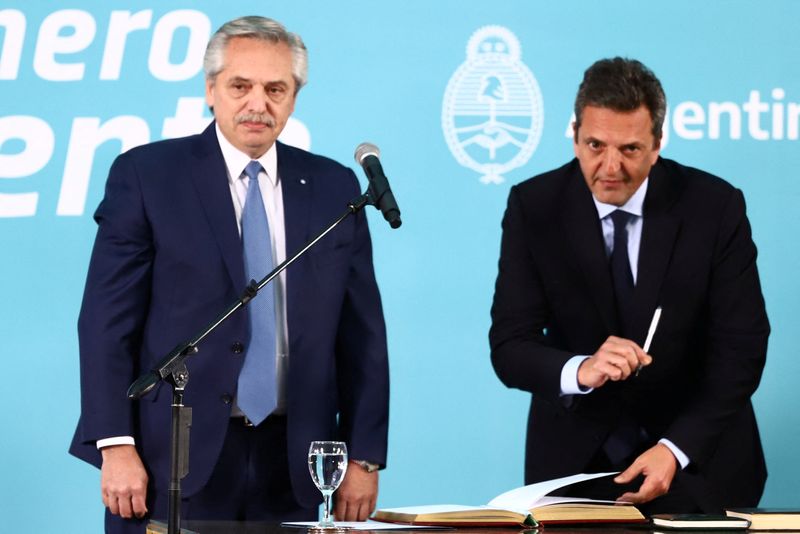Will the economy explode or will it continue to sail at the very high and accelerated rate of inflation of the last few months? According to Carlos Melconian, president of the Ieral of the Mediterranean Foundation, it is key to distinguish between “crisis” and “collapse”.
Collapse, he explained, were the Rodrigazo (1975), the hyperinflation of 1989 and the end and exit of the convertibility plan. “This is like in aviation, things do not happen by themselves, there is always the human issue. Taking into account what a collapse is and the will of the people to fix things, Argentina can avoid a collapse”, said Melconian, interviewed by Miter radio.
According to the economist, the problems that the Argentine economy was already suffering worsened with the magnitude of the drought. “It is not that this is a good government that had been managing well and the drought killed it. The exchange rate-inflationary conflict was prior to the drought, which ends up throwing it off the edge. If politically they want to say that they were doing well and it was the drought, no one believes it. But the magnitude and impact is phenomenal in revenue, exchange, activity, and price matters. That is why it is not feasible to reach August without additional shocks if no decisions are made,” said Melconian, who from the Ieral is working on the design of a “comprehensive” economic program to make available to the next government, whatever it may be.
If Argentina ends up having a 1.9% hole, it means that more is going out than coming in and since it has no financing, you have to hit the little machine. That means an inflation rate. And if the deficit is more, inflation will be higher”
Asked if the government will be able to meet the goals with the IMF, of a fiscal deficit of “only” 1.9% of GDP, which the hard Kirchnerism and the Cámpora want to ignore, Melconian asked to “stop speaking for the tribune.”
“People have to understand the following: if Argentina ends up having a 1.9% hole, it means that what comes out is more than what comes in and since Argentina has no financing, you have to hit the little machine. That means an inflation rate. And if it is more, inflation will be higher, ”he noted. And it was there that he returned to the initial statement and affirmed: “If they screw, there is a collapse; if not, there is no collapse”. But he added that the government is “unable to lift” in electoral terms.
If the problem is avoiding collapse, he said, it can be fixed. “But if they simultaneously want to be electorally competitive, that’s where the matete is set up.” As an example, he pointed to the government’s criminal complaint against Edesur, for the power cuts. “They are denouncing the salad that they put together for 20 years,” he said, referring to the policy of flattening rates and subsidizing the consumption of public services by postponing maintenance and investments.
“Assuming that Massa is rational and wants to do things, can he do them?” they asked him on the “Very Early Saturday” program. In response, Melconian recalled that Massa was summoned to the economy ministry more than two and a half years after the start of the current government and returning to the issue of public services, he said. “Argentina already bankrupted the public service companies at the end of the 80s. Then he tried a capitalist solution, that’s why there is still gas, electricity and water in Argentina. Now he is going for the attempt to break them again. If they leave you with no profitability, no income, 20 years below inflation, where will you end up?” he asked rhetorically. Now the complaints from the government appear, the fines, he explained. But to solve things you have to work “without the show.”

Melconian was caustic about Massa’s promise that starting in April the monthly inflation data would start “with the 3rd ahead.” If someone makes a promise to lose 10 kilos, but continues to eat ravioli, he graphed, he cannot keep it. “Back in January you had to say that it was not going to be 3 percent (future inflation) because what you are doing did not change in substance.”
But the economist clarified that he is more concerned about “post-August (PASO month) than pre-August.” The previous stage is manageable, he said, without the ruling party preserving electoral competitiveness. “But as an Argentine I am concerned about how the transition will be.”
– But after the STEP is there a way out?, they asked him.
“Yes, there is a way out. Things are fixed, the table of 2 exists in the world. Things have solutions. Always with conflicts, look at the French case and the case of health in Spain. Those issues always continue on another level of quality of life. In a democracy, this is triggered by social demand, which through the vote gives a mandate and forces the elected to go in search of what we are asking. There has to be an absolute recovery of honesty from the ruling class; It will be crucial to fix this. The public sector must be professionalized.”
And if the next government finds a way out, he clarified, “the improvement will be of a trending nature”, slow, cumulative. To underline the difficulty of this transit, Melconian resorted to the slogan “blood, sweat and tears”. People can bear them, he said, “when it is with a horizon; the problem is when the adjustments are fart, as is the case now”.
“The other side of blood, sweat and tears –he added- must be progress: not that you go backwards while others, who don’t know what they do, go forward. That’s what people can’t stand. That’s why honesty is essential.”
Asked if he would join the next government if called, Melconian reiterated that in the Ieral “we are working on a program that tries to be a set of ideas, that respects the table of 2, tries to keep our feet on the ground, not in terms of shock or gradualism. You have to give the right to politics, discussion, vehemence, hawks and doves. But in the end and based on the mandate, you have to put a program on the table and have the capacity to execute and manage. You cannot discover 7 years later that the stocks weren’t the first day, ”he said, referring to Alfonso Prat Gay, Prime Minister of Economy of the Macri government, who tacitly admitted that this was a mistake.
On the crucial question of the dollar, Melconian said that “it is clear that this government does not want to touch the exchange rate,” today at a price “at which there are no dollars.” However, he added, “he is going to have to invent something feasible, in a transition horizon.” Instead, he concluded, “everything that comes from January 1, 2024 onwards has to be “of a comprehensive nature, based on general rules, not on particular demands”.
Keep reading:

